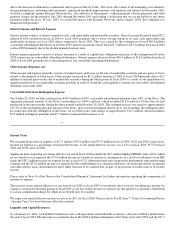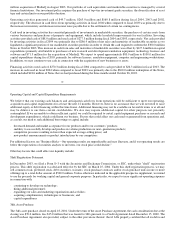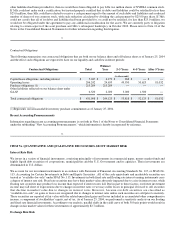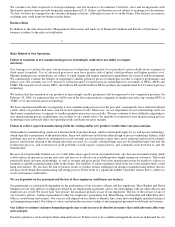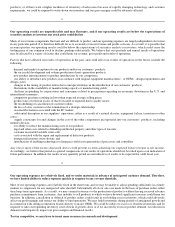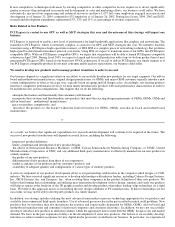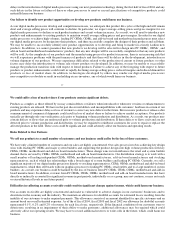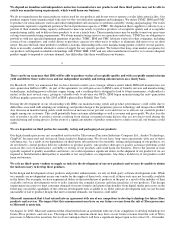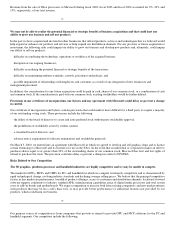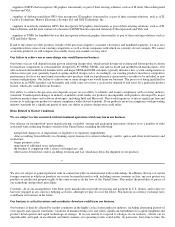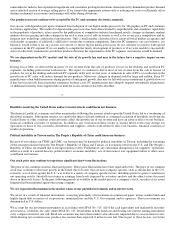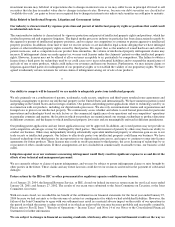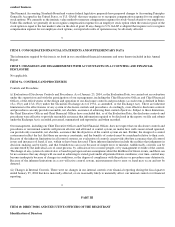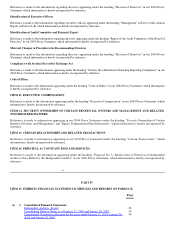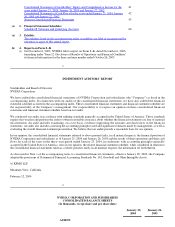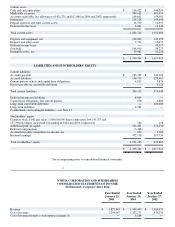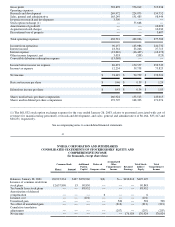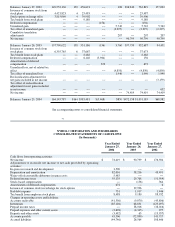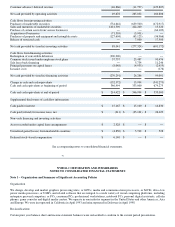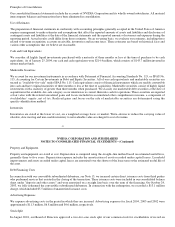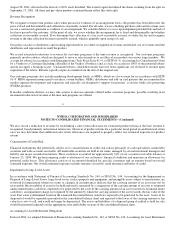NVIDIA 2004 Annual Report Download - page 30
Download and view the complete annual report
Please find page 30 of the 2004 NVIDIA annual report below. You can navigate through the pages in the report by either clicking on the pages listed below, or by using the keyword search tool below to find specific information within the annual report.
semiconductor industry has experienced significant and sometimes prolonged downturns characterized by diminished product demand
and accelerated erosion of average selling prices. If we cannot take appropriate actions such as reducing our costs to sufficiently offset
declines in demand, our revenues and earnings will suffer during downturns.
Our products may not continue to be accepted by the PC and consumer electronics segments.
Our success will depend in part upon continued broad adoption of our digital media processors for 3D graphics in PC and consumer
electronics applications. The market for digital media processors has been characterized by unpredictable and sometimes rapid shifts
in the popularity of products, often caused by the publication of competitive industry benchmark results, changes in dynamic random
memory devices pricing and other changes in the total system cost of add−in boards, as well as by severe price competition and by
frequent new technology and product introductions. Only a small number of products have achieved broad market acceptance and
such market acceptance, if achieved, is difficult to sustain due to intense competition. Since the PC segment is our core business, our
business would suffer if for any reason our current or future digital media processors do not continue to achieve widespread
acceptance in the PC segment. If we are unable to complete the timely development of products or if we were unable to successfully
and cost−effectively manufacture and deliver products that meet the requirements of the PC segment, our business would be harmed.
We are dependent on the PC market and the rate of its growth has and may in the future have a negative impact on our
business.
During fiscal 2004, we derived the majority of our revenue from the sale of products for use in the desktop and notebook PC
segments, including professional workstations . We expect to continue to derive most of our revenue from the sale or license of
products for use in the desktop and notebook PC segments in the next several years. A reduction in sales of PCs, or a reduction in the
growth rate of PC sales, will reduce demand for our products. Moreover, changes in demand could be large and sudden. Since PC
manufacturers often build inventories during periods of anticipated growth, they may be left with excess inventories if growth slows or
if they have incorrectly forecast product transitions. In these cases, PC manufacturers may abruptly suspend substantially all purchases
of additional inventory from suppliers like us until the excess inventory has been absorbed.
32
Hostilities involving the United States and/or terrorist attacks could harm our business.
The financial, political, economic and other uncertainties following the terrorist attacks upon the United States led to a weakening of
the global economy. Subsequent terrorist acts and/or the threat of future outbreak or continued escalation of hostilities involving the
United States or other countries could adversely affect the growth rate of our revenue and have an adverse effect on our business,
financial condition or results of operations. In addition, any escalation in these events or similar future events may disrupt our
operations or those of our customers, distributors and suppliers, which could adversely affect our business, financial condition or
results of operations.
Political instability in Taiwan and in The People’s Republic of China could harm our business.
Because of our reliance on TSMC and UMC, our business may be harmed by political instability in Taiwan, including the worsening
of the strained relations between The People’s Republic of China and Taiwan, or if relations between the U.S. and The People’s
Republic of China are strained due to foreign relations events. Furthermore, any substantial disruption in our suppliers’ operations,
either as a result of a natural disaster, political unrest, economic instability, acts of terrorism or war, equipment failure or other cause,
could harm our business.
Our stock price may continue to experience significant short−term fluctuations.
The price of our common stock has fluctuated greatly. These price fluctuations have been rapid and severe. The price of our common
stock may continue to fluctuate greatly in the future due to factors that are non−company specific, such as the decline in the U.S.
economy, acts of terror against the U.S., war or due to a variety of company specific factors, including quarter to quarter variations in
our operating results, shortfalls in revenue or earnings from levels expected by securities analysts and the other factors discussed
above in these risk factors. In the past, following periods of volatility in the market price of a company’s stock, securities class action
litigation had been initiated against the issuing company.
We are exposed to fluctuations in the market values of our portfolio investments and in interest rates.
We invest in a variety of financial instruments, consisting principally of investments in commercial paper, money market funds and
highly liquid debt securities of corporations, municipalities and the U.S. Government and its agencies. These investments are
denominated in U.S. dollars.
We account for our investment instruments in accordance with SFAS No. 115. All of the cash equivalents and marketable securities
are treated as "available−for−sale" under SFAS No. 115. Investments in both fixed rate and floating rate interest earning instruments
carry a degree of interest rate risk. Fixed rate securities may have their market value adversely impacted due to a rise in interest rates,
while floating rate securities may produce less income than expected if interest rates fall. Due in part to these factors, our future


